
Tamara Đorđević, known professionally as Ita Rina, was a Slovenian film actress and beauty queen. She was one of the major film stars in Germany and Czechoslovakia in the late 1920s and the early 1930s. Rina retired from her career shortly after her wedding in 1931, when she changed her religion from Roman Catholic to Serbian Orthodox and her name to Tamara Đorđević.
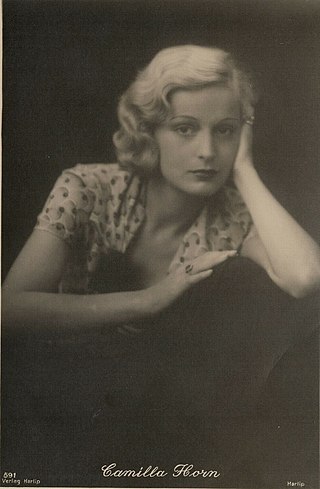
Camilla Martha Horn was a German dancer and a film star of the silent and sound era. She starred in several Hollywood films of the late 1920s and in a few British and Italian productions.

The Waldfriedhof Dahlem is a cemetery in Berlin, in the district of Steglitz-Zehlendorf on the edge of the Grunewald forest at Hüttenweg 47. Densely planted with conifers and designed between 1931 and 1933 after the plans of Albert Brodersen, it is one of Berlin's more recent cemeteries. Its graves include those of writers such as Gottfried Benn, composers such as Wolfgang Werner Eisbrenner and entertainers like Harald Juhnke, and put it among the so-called "Prominentenfriedhöfe" or celebrity cemeteries.

Friedemann Bach is a 1941 German historical drama film directed by Traugott Müller and starring Gustaf Gründgens, Leny Marenbach and Johannes Riemann. The film depicts the life of Johann Sebastian Bach's son Wilhelm Friedemann Bach. It is based on Albert Emil Brachvogel's novel Friedemann Bach. Wilhelm Friedemann Bach is shown as a gifted son trying to escape his father's shadow.
Geheimakten Solvay is an East German film. It was released in 1953, and sold more than 3,800,000 tickets.
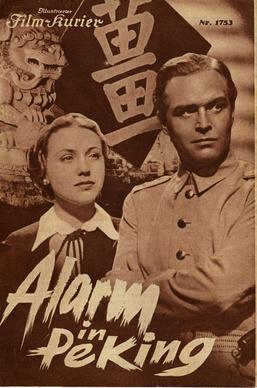
Alarm in Peking is a 1937 German adventure film directed by Herbert Selpin and starring Gustav Fröhlich, Leny Marenbach, and Peter Voß. It is set against the backdrop of the 1900 Boxer Rebellion in China. German filmmakers had frequently used China as a setting since the 1910s, but from 1931 onwards they made a series of films with political overtones. It was shot at the Johannisthal Studios in Berlin. The film's sets were designed by the art director Alfred Bütow and Willi Herrmann.
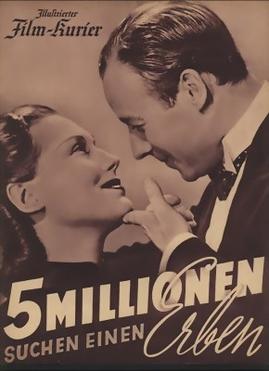
Five Million Look for an Heir is a 1938 German comedy film directed by Carl Boese and starring Heinz Rühmann, Leny Marenbach and Oskar Sima. It was based on a novel by Harald Baumgarten. It was shot at the Halensee and Tempelhof Studios in Berlin. The film's sets were designed by the art directors Alfred Bütow and Willi Herrmann.
Leny Marenbach was a German film actress. She was a leading German actress of the Nazi era, appearing in films such as the biopic Friedemann Bach. After the Second World War, she appeared in several DEFA roles.
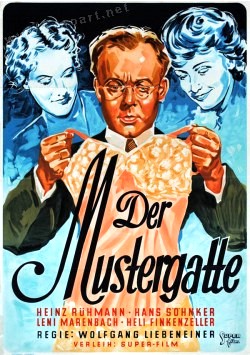
The Model Husband is a 1937 German comedy film directed by Wolfgang Liebeneiner and starring Heinz Rühmann, Leny Marenbach, and Hans Söhnker. It is based on a 1915 American play Fair and Warmer by Avery Hopwood. It was shot at the Johannisthal Studios in Berlin. The film's sets were designed by the art directors Otto Gülstorff and Hans Minzloff. The film was screened at the Venice Film Festival where it won an award. In the 1950s, it was remade twice: a 1956 West German film The Model Husband and a 1959 Swiss The Model Husband.

Target in the Clouds is a 1939 German drama film directed by Wolfgang Liebeneiner and starring Albert Matterstock, Leny Marenbach and Brigitte Horney. It was based on a novel by Hans Rabl. The film portrays the struggles of the fictional German aviation pioneer Walter von Suhr, an officer in the pre-First World War German army who saw the potential for military aircraft.

If We All Were Angels is a 1936 German comedy film directed by Carl Froelich and starring Heinz Rühmann, Leny Marenbach and Lotte Rausch. The overall plot was similar to that of The Virtuous Sinner (1931) which Rühmann had also appeared in. It was made at the former National Studios in Berlin while location filming took place around Cologne. The film's sets were designed by the art director Franz Schroedter. It was re-released in 1950 by Herzog Film.

Woman Made to Measure is a 1940 German comedy film directed by Helmut Käutner and starring Hans Söhnker, Leny Marenbach and Dorit Kreysler. Produced by Terra Film, it was shot at the Babelsberg Studios in Berlin. The film's sets were designed by the art director Willi Herrmann. It was based on the play of the same title by Erich Kästner.

Reckless Youth is a 1931 German film directed by Leo Mittler and starring Camilla Horn, Walter Rilla and Alfred Gerasch. It was made by Paramount Pictures at the Joinville Studios in Paris as a remake of the company's American film Manslaughter.
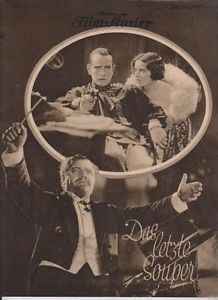
Theatre or The Last Supper is a 1928 German silent film directed by Mario Bonnard and starring Marcella Albani, Heinrich George and Jean Bradin.

Marriage in Small Doses is a 1939 German musical comedy film directed by Johannes Meyer and starring Leny Marenbach, Johannes Riemann, and Ralph Arthur Roberts. It was based on a play, which was also turned into a Swedish film Variety Is the Spice of Life the same year.
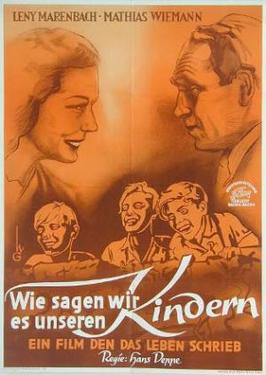
How Do We Tell Our Children? is a 1944 German comedy film directed by Hans Deppe and starring Leny Marenbach, Mathias Wieman and Hilde Körber. Made by the major German studio UFA, the film was not released until 21 December 1949 in Berlin and 13 March 1951 in Austria.

Wild Bird is a 1943 German romance film directed by Johannes Meyer and starring Leny Marenbach, Volker von Collande and Werner Hinz.

The Red Rider is a 1935 German drama film directed by Rolf Randolf and starring Iván Petrovich, Camilla Horn and Friedrich Ulmer. It is based on the 1922 novel of the same title by Franz Xaver Kappus which had previously been made into a 1923 silent film.

Mistake of the Heart is a 1939 German romantic drama film directed by Bernd Hofmann and Alfred Stöger and starring Paul Hartmann, Leny Marenbach and Hans Söhnker. It was shot at the Bavaria Studios in Munich. The film's sets were designed by the art directors Robert A. Dietrich and Artur Günther. It was produced and distributed by Bavaria Film, premiering at the Gloria-Palast in Berlin.

The Big Number or The Big Act is a 1943 German drama film directed by Karl Anton and starring Leny Marenbach, Maly Delschaft and Paul Hoffmann. A circus film, it was originally intended to star Harry Piel but due to delays on Panic he withdrew from the project, although he had contributed to the screenplay. Location shooting took place at the Circus Sarrasani in Dresden. The film's sets were designed by the art director Willy Schiller. It was one of three entertainment-focused films playing in Berlin at the time of the Sportpalast speech by Joseph Goebbels calling for total war.


















